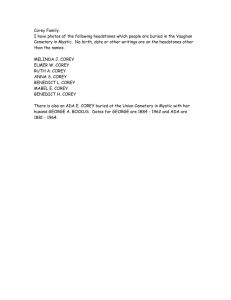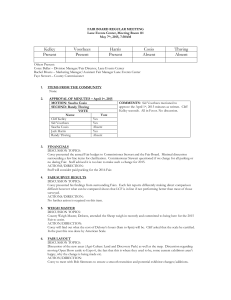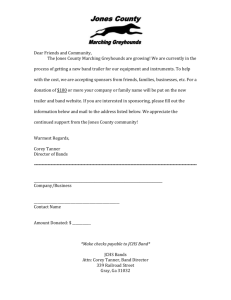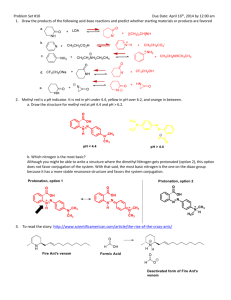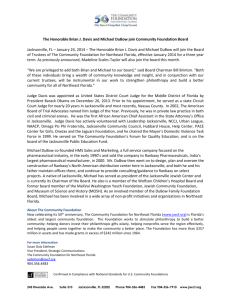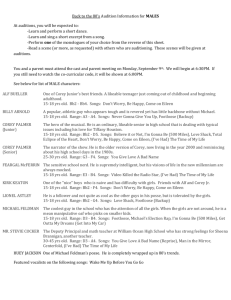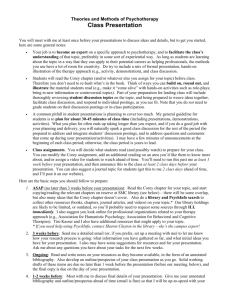free marissa- inside this brief toolkit
advertisement
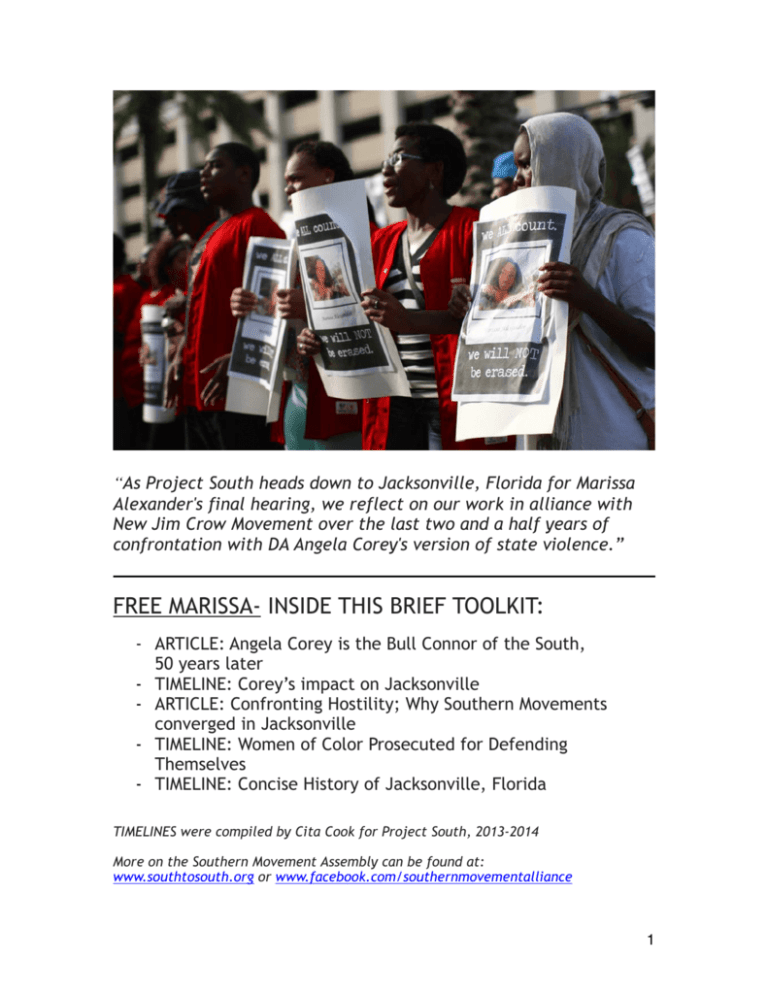
! “As Project South heads down to Jacksonville, Florida for Marissa Alexander's final hearing, we reflect on our work in alliance with New Jim Crow Movement over the last two and a half years of confrontation with DA Angela Corey's version of state violence.” FREE MARISSA- INSIDE THIS BRIEF TOOLKIT: - ARTICLE: Angela Corey is the Bull Connor of the South, 50 years later - TIMELINE: Corey’s impact on Jacksonville - ARTICLE: Confronting Hostility; Why Southern Movements converged in Jacksonville - TIMELINE: Women of Color Prosecuted for Defending Themselves - TIMELINE: Concise History of Jacksonville, Florida TIMELINES were compiled by Cita Cook for Project South, 2013-2014 More on the Southern Movement Assembly can be found at: www.southtosouth.org or www.facebook.com/southernmovementalliance 1 Angela Corey is the Bull Connor of the South, 50 years later. As Project South heads down to Jacksonville, Florida for Marissa Alexander's final hearing, we reflect on our work in alliance with New Jim Crow Movement over the last two and a half years of confrontation with DA Angela Corey's version of state violence. In 1965, Bull Connor in Birmingham and Sheriff Jim Clark in Selma represented the face of white supremacy and were important guardians of cruelty protecting Jim Crow South as local law enforcement. In public protests, they knocked heads into concrete, tear gassed crowds, and unapologetically defended organized racism. Angela Corey, the top cop District Attorney in Florida's 4th district represents the face of this history today, reflecting a growing trend of 21st century racist cruelty that incarcerates teenagers and domestic abuse survivors while letting murderers walk out without consequence. Corey's version of legal terror uses the courts instead of the streets to remind us ‘who is boss’ by enforcing public and racist hostility. Her attack on Marissa Alexander is not just about punishing one woman. After Marissa won an appeal and secured a second trial that threw out a 20-year sentence, Angela Corey ran an intimidation campaign, announcing publicly that she would seek a 60-year sentence in the new trial. As much as this fight feels like a personal vendetta, Corey has built her entire career on excessive punitive practices that have set wild records for over-sentencing and sending disproportionate numbers of juveniles to adult court. Corey’s actions in Marissa’s case are directly connected to punishing the growing movement that has risen to confront the public killings of Trayvon Martin in Sanford FL and Jordan Davis in Jacksonville FL, where she also served as prosecutor. Forced into a plea deal that will keep her under state surveillance and detained at her home for two more years, Marissa is part of growing trends in incarceration that force plea deals and keep more and more people under state control in their own homes. As in the days of Bull Connor, people have not remained silent in the face of this brutality. Social movements are rising again to confront racist violence and the legal frameworks that protect it. On April 26, 2013, Marissa's mother Ms. Jenkins attended the second Southern Movement Assembly anchored by the New Jim Crow Movement in a park on the historically Black Northside of Jacksonville. Under an old army tent, donated by a local church, a participant read a heartfelt letter written by Marissa to the entire assembly of 250 representatives from 10 states. We stormed the Duval County Courthouse the next day, and the Southern Movement Assembly participants committed to both Marissa's individual fight for freedom and the broader pattern of injustice that this case represents. A few months after that on July 14, 2013, Angela Corey was smiling at the press conference that announced Zimmerman’s acquittal for the murder of Trayvon Martin. Grassroots movements sprung into action, and the Southern Movement Assembly organized the Walk for Dignity from Jacksonville to Sanford. The call from Aleta Alston-Toure of Jacksonville was met by hundreds of people, over 25 organizations, churches, and community groups. We walked for two demands: Free Marissa Alexander & Fire Angela Corey. This ongoing fight has galvanized new generations of active communities who say: Enough is Enough. 2 On the eve of her release into home detention, we recognize the incredible grassroots movements in Florida, around the South, and across the country that have made sure that Marissa’s case was part of a national dialogue and that also made important connections between this case and the growing impunity for violence we see in our communities. FOR MORE: CHECK OUT WWW.SOUTHTOSOUTH.ORG & THE SOUTHERN PEOPLE’S INITIATIVE 3 THE HISTORY OF ANGELA COREY’S IMPACT ON JACKSONVILLE October 31, 1954 - Angela B. Corey, the granddaughter of Syrian immigrants, was born in Jacksonville, Florida. She grew up on the Southside and majored in Marketing at Florida State University. 1979 - Corey received a doctorate in law from Levin College of Law at the University of Florida. 1981 - 2006 - Corey was hired as an Assistant State Attorney in Florida’s Fourth Judicial Circuit Court (Duval, Nassau, and Clay Counties) and tried hundreds of cases, including sixty-five homicides. 1991 - Harry Shorstein, a Democrat, was appointed to be State Attorney for the Fourth Judicial Circuit. July 1, 1994 – A new law, passed by the Florida legislature in response to a tourist industry panic about teenage criminals, gave prosecutors the power to send juveniles to adult courts without having to wait any longer for a judge to hold a hearing on which court would be most appropriate for each case. 1998 – State Attorney Harry Shorstein established the use of civil citations in Duval County Public Schools, allowing school officers to cite rather than arrest students for certain first-time misdemeanors. March 1999 – In Wieland v. State, the Florida Supreme Court ruled that women have the right to rely on the battered spouse syndrome as a defense to killing their abuser. 2005 - Shorstein changed Corey’s work assignment from Director of the Gun Crime Unit to Director of the County Court, which handles misdemeanors. She trained newly hired lawyers to be prosecutors. 2006 - Corey announced that she would run against her boss, Harry Shorstein, to be State Attorney. November 2006 - When Shorstein received complaints about Corey as a supervisor, he fired her. Corey said it was because she was running against him. He then announced he would not run for re-election. 2007 - John Tanner, the State Attorney for the Seventh Judicial Circuit, hired Corey. Shorstein was overseeing a grand jury investigation of Tanner’s handling of a Flagler County Jail investigation. August 26, 2008 - Corey won the election as State Attorney in the 4th Circuit with over 64% of the votes. 2009 - Soon after taking office, Corey fired ten assistant state attorneys, over half of the investigators, and forty-eight support employees. That year she sent 230 juvenile felony cases to adult court, twice the number in all the years before she became State Attorney in the Fourth Judicial Circuit Court. August 2009 - Corey asked Florida’s U. S. Senators not to recommend Shorstein for the position of U. S. Attorney for the Middle District of Florida because he used “the grand jury for personal vendettas” and said she would refuse to speak with Shorstein if he were appointed. He was not appointed. August 1, 2010 - Marissa Alexander, a thirty-one-year-old African American woman from Jacksonville, fired a warning shot to stop her abusive husband from attacking her. The bullet did not hit anyone. March 14, 2011 - Toddler David Galarrage, the younger half-brother of Cristian Fernandez, was taken to the hospital; he died two days later from a fractured skull and bleeding brain. June 2, 2011 - Corey sought and received a grand jury indictment of twelve-year-old Cristian Fernandez for killing his two-year-old brother and for aggravated child abuse, 4 making him the youngest person ever charged with murder in Florida. By combining the two cases, Corey turned the charge into one of felony murder, meaning she would not have to prove premeditation for the murder and could ask for a sentence of life without parole. Although Cristian, whose mother was twelve when he was born, had suffered repeated physical and sexual abuse, Corey decided to try him as an adult, ignoring widespread pressure to try him in juvenile court. She eventually claimed that because she had always intended for him to accept a lesser plea (which he did in 2013), he was never really in danger of receiving a life sentence. December 2011 - Corey was listed as a host for a fundraiser for the re-election of Public Defender Matt Shirk. She was trying to convince Shirk to accept a plea agreement for Cristian Fernandez. January 5, 2012 - Corey charged Cristian Fernandez with sexual battery of his younger half-brother, a charge that was later thrown out by a judge. February 26, 2012 - George Zimmerman, a twenty-eight-year-old neighborhood watch volunteer, shot and killed Trayvon Martin as Martin, a seventeen-year-old African American, was walking from a store in Sanford, Florida to the home where he was staying. A few hours later, the Sanford Police Department declared that they would not be arresting Zimmerman because he had fired in self-defense. March 2012 - March 22, 2012 - After both Sanford Police Chief Bill Lee and Seminole County State Attorney Norm Wolfinger resigned from the Zimmerman case, Governor Rick Scott appointed Corey to be the Special Prosecutor. Sandy D’Alemberte, former president of the American Bar Association and former president of Florida State University, emailed that he could not “imagine a worse choice for a prosecutor to serve in the Sanford case.” One reason he gave was that she could not “command the respect of people who care about justice.” Michael Hallett, the Chairman of the University of North Florida’s Department of Criminology and Criminal Justice, said the Zimmerman case would enable her to shift the media focus away from the Cristian Fernandez case and “to show concern for a black victim.” At this time, Corey hired Jackelyn Barnard, a veteran television reporter, as her Director of Communications. April 2012 - In responding to a question about Florida’s Stand Your Ground Law, Corey said, “I’ve prosecuted a woman who shot her husband and killed him because he slapped her, and we argued that [the slap] was not deadly force and she was convicted and sent to state prison.” April 11, 2012 - Corey charged George Zimmerman with second degree murder. May 2012 – After Marissa Alexander refused to accept a three-year plea bargain offered by Corey, a jury declared her guilty. She received a mandatory minimum sentence of twenty years. June 2012 - In Miller v. Alabama, the Supreme Court ruled that giving a juvenile a mandatory sentence of life without parole is unconstitutional. This meant that Corey could no longer legally threaten Cristian Fernandez with such a sentence. June 2012 - Alan Dershowitz, a defense attorney and professor at Harvard Law School, criticized Corey for not giving Zimmerman’s defense team the pictures of Zimmerman showing his injuries after the killing, as well as not taking the case to a grand jury. She then tried to convince Harvard University to fire Dershowitz and threatened to sue him for libel and slander, as well as to have him disbarred. June 14, 2012 - Ronald Thompson, a white military veteran in his sixties, received a twenty-year sentence for having shot twice in the ground to try to scare off some teenagers who were threatening his neighbor (the grandmother of one of the young men). Angela Corey had refused to accept the three-year sentence a review judge had said was the only constitutional sentence they could impose. Eventually, Thompson was freed on appeal. He may be too ill to last until another trial. October 2012 - Travis Swanson, a Jacksonville African American youth, was sentenced 5 to twenty-two years in prison for a robbery with a BB gun that he was allegedly involved in at seventeen. He was pressured to confess without having been read his Miranda Rights. While Angela Corey was not the trial attorney in the case, it did occur under her jurisdiction. November 23, 2012 - Michael David Dunn, a forty-six year old white software developer became so irritated with the loud music (what he called “thug music”) coming from a car next to him, that he fired into the car and killed Jordan Davis, a seventeen-year-old African American. December 2012 - Wesley White, a prosecutor under Corey, resigned because of disagreements with her priorities as a prosecutor. January 8, 2013 - Angela Corey was sworn in for four more years as Fourth Circuit State Attorney. February 2013 -- Cristian Fernandez pled guilty to manslaughter for the death of his two-year-old half-brother in 2011 when Christian was twelve years old. He was sentenced to detention in a juvenile facility until his nineteenth birthday. February 20, 2013 - Corey announced that she would personally prosecute Michael Dunn for the first-degree murder of Jordan Davis. April 19, 2013 - A fourth high-level employee in the State Attorney’s Office resigned because of disagreements with Corey, including over her decision to grant herself and another official an increase in their pension fund (a legal action). July 13, 2013 - Corey fired Ben Kruidbos, an information technology director in her office, for making public his charge that Corey had withheld from the defense photos of Trayvon Martin that supposedly would make him seem less sympathetic. July 14, 2013 - A jury of six women (five white, one Latina) decided that George Zimmerman was innocent of either second-degree murder or manslaughter when he shot and killed Trayvon Martin. July 15, 2013 - Corey stated in a press conference that the case against Zimmerman was never “about race or the right to bear arms.” July 16, 2013 - Ben Kruidbos announced that he would be filing a whistleblower suit against Corey. July 20, 2013 – About a thousand supporters of the Free Marissa Now coalition protested outside Corey’s office, urging her to resign. July 26, 2013 - Governor Rick Scott rejected the call by the Florida Civil Rights Association to remove Corey from the trial of Michael Dunn, accused of the shooting death of Jordan Davis. August 15, 2013 - The trial of Michael Dunn for the murder of Jordan Davis, with Corey as the prosecuting attorney, was postponed to early 2014. September 26, 2013: Florida’s First District Court of Appeals overturned the conviction of Marissa Alexander, saying that the jury had been given “erroneous” instructions. Angela Corey indicated that she would ask for a new trial. October 2013 – U. S. Rep. Corrine Brown told U. S. News that Corey is notorious among her constituents for overcharging people accused of crimes. November 28, 2013: Marissa Alexander was given house arrest in exchange for $200,000 bail. January 2014 – In a luncheon speech, Corey stated that the media shouldn’t be allowed to report on high-profile cases since “The public doesn’t need to know anything about a case before it goes to trial.” January 5, 2014 – The parents of Jordan Davis settled a civil lawsuit against Michael David Dunn because he had shot and killed their son. Dunn’s insurance company declared that it should not have to pay the settlement and Dunn had already been declared legally broke. 6 January 20, 2014 – Angela Corey’s office requested that Circuit Court Judge James Daniel revoke Marissa Alexander’s bail, claiming she had violated her release conditions when she had left her house to do things such as shop for clothes, renew her driver’s license, and visit her sister-in-law. Daniel refused, saying Alexander had gained approval from the Jacksonville Sheriff’s Office in each case. February 3, 2014 – The Florida Times-Union reported that between 2009 and 2013, the Fourth Judicial Circuit, headed by State Attorney Angela Corey, had issued 1,475 direct commitments, requiring juveniles to choose between being charged as an adult and accepting assignment to a juvenile facility; they often have had to make this choice without being allowed to know or question the evidence against them. During that same period, there were only 34 direct commitments in Miami, where there are twice as many youth as in the Jacksonville area. Angela Corey’s office issued a statement saying, “Juvenile cases…are handled no differently than how an adult case moves through the judicial system.” February 16, 2014 – After thirty-two hours of deliberations over four days, a jury ruled that Michael David Dunn was guilty of three counts of second-degree attempted murder for his having endangered the lives of the three friends of Jordan Davis but deadlocked on the charge of first degree murder for killing Davis. When Circuit Judge Russell Healey declared a mistrial for that count, Corey called for a retrial. Although the convictions could lead to a sentence of at least sixty years, the judge decided not to impose a sentence until after the second trial, currently set for September 22, 2014. February 18, 2014 – Juror Number Four from the Michael Dunn trial, a white woman, reported on ABC’s “Nightline” that nine of the twelve jurors had favored a conviction for the first-degree murder charge for killing Jordan Davis because they did not believe that Dunn was ever in real danger from any of the four teenagers. The jury did not, however, discuss whether race might have been a factor in the crime because “it was never presented that way.” March 10, 2014 – The National Organization for Women announced that it was calling for the resignation of State Attorney Angela Corey because of how she was handling the case against Marissa Alexander. Florida New Majority, another group which has backed Alexander’s release, announced that they were looking for candidates to run against Corey in 2016. March 11, 2014 – The Florida Times-Union reported that since 2009, Angela Corey had sent more people to death row than any other prosecutor in the state. The total was 25% of those in Florida, even though her jurisdiction represents less than 7% of the population and 8% of Florida’s murder rate. Of the 21 people her office sentenced to be executed, 66% were African American; only 25% of the people in her district are black. March 18, 2014 – Jackelyn Barnard from Angela Corey’s office sent an email to state legislators from Northeast Florida describing Corey’s version of what happened when Marissa Alexander fired a gun in the presence of Rico Gray and their interactions after that, supposedly so the legislators would know how to respond to questions about the case. Bruce Zimet, Alexander’s attorney, responded that Corey’s narrative was only one version of the facts of the case. The state legislature at that time, influenced by Alexander’s case, was considering a bill to expand the Stand Your Ground Law to grant those with a credible fear for their lives immunity from prosecution for warning shots. March 19, 2014 – Color of Change, a national advocacy group, asked Governor Rick Scott to suspend Angela Corey because the way she was conducting her job was similar to the style of “Jim Crow era prosecutors and legal authorities.” Corey’s spokeswoman, Jackelyn Barnard, told U. S. News that Corey had a “thirty-two year record of seeking justice for all victims, regardless of gender or race.” 7 April 3, 2014 – Corey had agreed to meet with a group of Jacksonville clergy in the Interfaith Coalition for Action, Reconciliation, and Empowerment (ICARE) to discuss the possibility of issuing more juvenile civil citations instead of criminal charges. When she saw that they had asked the media and parishioners to be there, she debated with them for about ten minutes and then left. According to the Florida Department of Juvenile Justice, from March 2013 to February 2014, only 26% of young people eligible for a citation instead of a criminal charge received them, while the rate in Miami-Dade County was 86%. Corey claimed those figures were incorrect. April 8, 2014 – The Jacksonville City Council agreed to delay voting on a resolution calling for an increase in the use of civil citations for juveniles until State Attorney Angela Corey could speak to them. April 15, 2014 – Corey issued a public statement stressing her support for the use of non-custodial arrests, including civil citations, except in cases when there is a victim since prosecutors in Florida are obligated to consult with victims before determining the status of accused people. May 18, 2014 – Supporters of the Jacksonville Juvenile Drug Court, including Chief Circuit Judge Donald Moran, stated their concern that this alternative to a criminal record for juveniles may be closed or cut back because Angela Corey’s office has referred so few of the eligible youth: 19 in 2013, as compared to 92 in 2009. Corey’s spokeswoman said there are legitimate reasons for the lower number, but Public Defender Matt Shirk plans to lobby the legislature to allow judges to send someone to juvenile drug court without consulting a prosecutor, as they already can do in the case of adults. May 27, 2014 – The Jacksonville City Council, disagreeing with the position Angela Corey had presented to them, passed a resolution calling for more efficient use of the civil citation process for eligible first-time misdemeanor juveniles, as the Florida legislature had encouraged all communities in Florida to do in 2011 through HB 997. June 10, 2014 – Judge James Daniel pushed the date of a retrial for Marissa Alexander to December 2014 in order to be able to consider the implications of the new WarningShot Bill. June 20, 2014 – Governor Rick Scott signed house Bill 89, known as the Warning Shot Law, legalizing the threat of force in circumstances when actual force would be permitted as self-defense. The Marissa Alexander case was one of the primary inspirations for the bill. July 18, 2014 – Judge James Daniel ruled that Marissa Alexander is not entitled to a 2nd immunity hearing under Florida’s Stand Your Ground law, saying the appellate ruling calling for a new case addressed only the jury instructions, not the facts of the case and the new warning shots law could not be applied retroactively, even though the law was partly inspired by her case. 8 9 10 WOMEN OF COLOR WHO HAVE BEEN PROSECUTED FOR DEFENDING THEMSELVES 1855 - Celia, an enslaved Missouri woman, was hanged for killing with a stick the white widower who had bought her five years earlier, when she was fourteen, and had raped her frequently from then on. According to historian Melton McLaurin in Celia, A Slave, Celia may have lied to protect her enslaved husband, who disappeared soon after the killing. The judge for her case told the jury that a slave had no right to resist her master, even in a case of sexual assault. Early 1860s - An enslaved woman named Agnes, living in Washington D. C., was executed for killing her master with an axe after he had beat and raped her for many years. 1913 - Mary Wilson, a black woman in San Antonio, shot and killed in self-defense a white trooper who had threatened and then grabbed her. There is apparently no clear record of what then happened to her. March 5, 1945 - Lena Baker became the only Georgia woman to be executed in the electric chair. A domestic worker in Cuthbert (south of Columbus), she killed a white man who had hired her and then had made her a sex slave. In a fight when she was trying to leave, he raised an iron bar to hit her and she grabbed his gun and shot him. Some of her last words were, “What I done, I did in self-defense, or I would have been killed myself.” In 2005, the Georgia Board of Pardons and Paroles pardoned her posthumously. 1948 – Rosa Lee Ingram, an African American sharecropper and widowed mother of twelve children from Ellaville, Georgia (north of Americus), was sentenced to death with two of her sons (aged 14 and 16) for killing a white sharecropper in self-defense after the sixty-four-year-old man tried to force her to have sex with him and bludgeoned her with his gun. After the Civil Rights Congress (1946-1956), the NAACP, and others brought international attention to the case, their death sentence was amended to life in prison. Mary Church Terrell, Shirley Graham DuBois, and other well-known African American women organized the National Committee for the Defense of the Ingram Family, which sent pleas to politicians every Mother’s Day until the state of Georgia released the Ingrams in 1959. Many of the women in the Defense Committee were also founders of the Sojourners for Truth and Justice, a group of left-wing black women organized in 1951 who praised Rosa Lee Ingram for “defending the honor of all womanhood,” declaring, “WE SHALL NOT BE TRAMPLED UPON ANY LONGER.” 1972 – Yvonne Wanrow, a member of the Confederated Tribes of the Colville Reservation in Washington State, shot to death a man who was attempting to molest her son. After being convicted of second-degree murder and first-degree assault, an Appeals Court and then the Supreme Court of Washington overturned the conviction and ordered a new trial. Taking the advice of William Kuntsler and other experienced criminal attorneys, she accepted a plea bargain requiring her to do 2,000 hours of community service, which she carried out by counseling and teaching others who had left her reservation. March 17, 1974 – Inez Garcia, a thirty-three year old California farmworker with Puerto Rican and Cuban roots, was raped by two men. After they threatened to kill her, she went to their house and confronted them. When one of them threw a knife at her, she fired and killed him. The Inez Garcia Defense Committee publicized her case. 11 She lost her first trial and served two years before an appeal led to a second trial in 1977 when she was acquitted. August 27, 1974 – Joan (Jo-Ann) Little, a twenty-year-old black woman in Beaufort, North Carolina was waiting to learn what kind of charges she was facing for allegedly breaking and entering. A white jailer threatened her with an ice-pick unless she performed oral sex; she was able to grab the ice-pick, stabbed him a number of times, and fled the jail. With money raised by the Joan Little Defense Committee, her defense team commissioned surveys which revealed that about two-thirds of the white respondents in the area near her home believed that black women are lewder than white women and that black people are more violent than white people. This information convinced a judge to move the trial to Raleigh where a jury of six whites and six African Americans ruled that she was not guilty. 1975 – Dessie Woods, a black woman from Atlanta, killed a white man who tried to rape her while giving her and a friend a ride; she received a twelve-year sentence (two concurrent sentences). Her strongest supporters, black nationalists in the National Committee to Free Dessie Woods, publicized the severe treatment she received in the Georgia prison where she was often left drugged and naked in solitary confinement. In June 1981, an appeals court overturned the charge of armed robbery but not that of manslaughter; she was released later that year. May 1978 – Cassandra Peten, a young black mother and shipyard worker in San Francisco, had an altercation with the abusive husband she had recently left. When he raised his fist to hit her, she shot him, slightly wounding him in the leg; she was convicted of assault with a deadly weapon. Under pressure from the publicity stimulated by a defense committee, the judge put off sentencing until she had undergone a three month psychiatric observation period. At the end of that observation, he released her on parole. May 10, 1977 – Sharon Crigler, a twenty-one-year old black mother in Tacoma, Washington, accidentally killed her abusive and threatening ex-boyfriend when she shot through the door he was trying to unlock with keys given to him by her apartment manager. She was found guilty, but because the judge had described her to the jury as “one of those welfare mother leeches who suck up my tax dollars,” the first trial was overturned. The appeals judge, however, ruled that her case did not involve selfdefense and ordered a re-trial. In 1980, she accepted a deal that gave her probation in exchange for a guilty plea. March 2012 - Marissa Alexander, a thirty-one-year-old African American woman from Jacksonville, was sentenced to twenty years in prison for firing a warning shot to stop her abusive husband from attacking her without harming him. When, in November 2013, her first trial was overturned and she was released on bond, Angela Corey, the Prosecuting Attorney, proclaimed that she would seek to impose a sixty year sentence in her next trial. Alexander is currently confined to her home with a tentative trial date of December 1, 2014 and was denied the right to use a Stand Your Ground defense in July. June 2012 – CeCe McDonald, an African American transgender woman and activist in Minneapolis, was tried for stabbing to death a man who had attacked her and her friends. After an expert witness was not allowed to testify about the role that her race and gender identity had played in the attack against her, she accepted a plea bargain for second-degree manslaughter due to negligence and was sentenced to forty-one months in prison. 12 Information was available about most of the women mentioned here only because some people were able to organize strong campaigns to support them. We’ll never know the numbers or names of all of the women who were sentenced and often lynched or executed after defending themselves when in danger from abusers and rapists. We can, however, be certain that they have always been a large percentage of the women of color in prison because white authorities are less apt to see them as victims than they will many white women. See also: Sharon Angella Allard, “Rethinking Battered Woman Syndrome: A Black Feminist Perspective,” UCLA Women’s Law Journal, 1991: http://escholarship.org/uc/item/62z1s13j. 13 CONCISE CHRONOLOGY OF THE HISTORY OF JACKSONVILLE, FLORIDA 1502-1700s - Some enslaved and/or free people with African roots came with the Spanish conquistadores (conquerors) and often served as translators for interactions with the indigenous people. The Spanish Slave Code, unlike the practices in AngloAmerica, allowed individuals to buy their freedom, maintain their family ties, and sue their masters for mistreatment. 1683 - The Spanish Governor of Florida supported the formation of a black militia in St. Augustine. 1690s - Enslaved Africans in (South) Carolina began escaping to St. Augustine. They could receive sanctuary if they were baptized as Catholics and (if male) would serve in a militia for four years. 1738 - North of St. Augustine, a Mandinga captain, Francisco Menendez, who had escaped slavery in South Carolina, commanded the militia at Fort Mose (pronounced “Moh-say”) for over forty years. 1763 - Spain ceded Florida to the British; most free blacks moved to Cuba. 1783 - At the end of the American Revolutionary War, England returned Florida to Spain. 1821 - The Adams-Onis Treaty gave Florida to the United States. The treaty granted free blacks certain legal and property rights, but most left for Cuba. 1822 - The town of Cowford changed its name to Jacksonville, honoring Andrew Jackson. 1826 - Florida Territory forbade free blacks from entering Florida. 1845 - Florida became a state. 1861-1865 - During the Civil War, hundreds of enslaved men from the area joined the First, Second, and Third South Carolina Regiments (the black Glory Brigades) of the U. S. Army. 1867 - African Americans met in Jacksonville to choose candidates for city elections. They passed a resolution asserting “there is no distinction between the white and black man in political matters.” 1867-1869 - African American voters in Jacksonville elected black delegates to the Florida State Constitutional Convention and representatives to the Jacksonville City Council and the Duval County School Board. Black men also served as policemen, marshals, judges, and justices of the peace. 1886 and 1888 - Mosquito bites led to major yellow fever epidemics. By November 1888, the city employed over 1400 African Americans for relief projects. When the Committee on Sanitation announced that they were laying off half of the workers, nearly a thousand unemployed African Americans and their families demonstrated and held nightly meetings until the jobs were restored. 1886 - Candidates sponsored by a coalition of the Knights of Labor and African American Republicans won the city elections in Jacksonville. 1888 - After black women gathered near polling places to encourage black men to vote the right way, Jacksonville elected a number of African Americans to local offices. The state legislature nullified Jacksonville’s charter, disbanded its elected government, and replaced it with men appointed by the Governor. Other new laws restricted more of the rights of African Americans. 14 1892 - When the white community threatened to lynch Ben Reed, an African American, for killing a white man in a fight he had not started, about five-hundred armed black men organized a sentry system, preventing lynchers from taking Reed out of the jail, escorting white people who passed through, and allowing twenty white policemen to go into the jail. Reed was sentenced to four years in jail. 1900 - James Weldon Johnson, the principal of the only black middle school in Florida, wrote the words and his brother, Rosamond Johnson, composed the music for “Lift Every Voice and Sing.” 1901 - When white insurance companies stopped serving black people, Abraham Lincoln Lewis and some other men founded the African American Life Insurance Company. May 3, 1901 - The Great Fire in downtown Jacksonville left 10,000 homeless. 1901 and 1905 - African Americans, especially women, organized boycotts of segregated streetcars. February 1917 - James Weldon Johnson organized the first meeting of the Jacksonville NAACP. September 7, 1919 - Two black men were lynched in Jacksonville. 1920 - By October 17, over seven thousand African American women had registered to vote in Jacksonville and over one thousand black men, in spite of various forms of harassment. Democratic officials used tricks and lies to prevent three to four thousand African Americans from voting. April 27, 1957 - The James Weldon Johnson Middle School and the Jacksonville Jewish Center were bombed to warn people not to support desegregation. 1960 - Three African American businesses were bombed in Jacksonville. August 13, 1960 - After nonviolence training overseen by their teacher, Rutledge Pearson, teenagers Rodney Hurst and Alton Yates and the other members of the NAACP Youth Council began sit-in demonstrations at the lunch counters at Woolworth’s and other downtown stores. August 27, 1960 - About 150-200 members of the Ku Klux Klan and other racist groups, carrying ax handles, baseball bats, and other kinds of clubs, threatened to organize citywide boycotts if the stores made an agreement to serve food to black customers. They then attacked student demonstrators who had been kicked out by a store manager. The police stayed away until members of a group known as the Boomerangs began assisting the demonstrators. Early 1964 - Roderick Pearson led a new action campaign against still segregated businesses. February 16, 1964 - A bomb caused serious damage (but no human injuries) to the house of Iona Godfrey, an activist and mother of a child who had integrated an all-white elementary school. In March, the FBI (not the local police) arrested the bomber and then six accomplices. March 23, 1964 - As the Civil Rights Bill came close to passage in Congress, some whites in Jacksonville circulated a false report that four black males had beaten and robbed a white man. After the NAACP led several hundred African Americans in a protest at Hemming Park, students in a high school pulled a fire alarm so most could join the protestors. Over the next several days, some people attacked buildings with firebombs and threw rocks at cars. Martin Luther King Jr. offered to go to Jacksonville to help, but Roderick Pearson asked him not to. After a white man was injured by a thrown 15 brick and cars were firebombed, Pearson convinced the youths to stop all violence from their side. March 23, 1964 - In a poor neighborhood away from downtown, Johnnie Mae Chappell, the mother of ten children, was looking along a roadside for a wallet she had dropped. A car drove by with four men wanting to punish someone black for the “riots.” One of them shot and killed Chappell. He eventually served only three years of a ten-year sentence and the charges against the other three were dropped. August 2006 - After two black firefighters in Jacksonville found nooses hanging inside their lockers, a Human Rights Commission Report concluded that the Jacksonville Fire and Rescue Department was allowing widespread discrimination against African Americans. March 2012 - Marissa Alexander, an African American thirty-one-year-old woman from Jacksonville, was sentenced to twenty years in prison for firing what she said was a warning shot to stop her abusive husband from hurting her. Her husband was not hurt. Her case was overturned a year and a half later. April 2012 - The U. S. Department of Justice filed suit against the City of Jacksonville, accusing them of violating Title VII of the Civil Rights Act of 1964. October 2012 - Travis Swanson, a Jacksonville African American youth, was sentenced to twenty-two years in prison for a robbery with a BB gun that he was involved in at seventeen. He was pressured to confess without having been read his Miranda Rights. November 2012 - Jordan Davis, a seventeen-year-old high school student, was shot to death at a gas station by a man upset by the loud music Davis was playing; he claimed he thought Davis had a gun. February 2013 -- Christian Fernandez pled guilty to manslaughter for the death of his two-year-old half-brother in 2011 when Christian was twelve years old. 16 #BLACKWOMENSLIVESMATTER A TELEVISED PEOPLE’S MOVEMENT ASSEMBLY: TAKING ACTION ON STATE VIOLENCE AGAINST WOMEN Hosted by Denyce Gartrell, CEO of More Than a Woman WJCT/ PBS, 100 Festival Park Ave., Jacksonville, FL. 32202 Wednesday, January 28, 2015 at 1:00 PM A call for political movement building since Winnie Mandela, Angela Davis,and Assata Shuker cases. GOALS: ● Articulate a set of actions for political change in our struggle. ● Documenting the Domestic Violence & Sexual Abuse Epidemic. ● Recollect how we became the back seat discussion of #blacklivesmatter. ● Outline the struggle of plea bargaining amongst black women nationwide. ● Contribute black women sheros discussions and their work since Emancipation. ● Economic Exploitation through jobs, children, family, state/federal programs and prisons. ● Questions Framed by: " The significance of bottom up global world political movement building has been indoctrinated through the Southern legacies of Ella Baker and Fannie Lou Hamer. These same organizing strategies exist today and have been catapulted through the present nationwide sentiment of cases such as, Trayvon Martin, Michael Brown and Eric Gardner. Here in Jacksonville, FL., Free Marissa Now organizers from across the country will share for the world the ambivalent attitude towards women and the systematic racism noted as gendered racism. The People’s Movement Assembly process broadens the discussion to those in the community where the people are directly involved in the strategies and the outcomes that will be discussed. #BlackLivesMatter Caravan will also be here from California. We believe that we can win and we believe that #blacklivesmatter. Free Marissa Now * freemarissanow.org * facebook.com/freemarissanow Donate to the television event: www.gofundme.com/freemarissanowtv #blackwomenslivesmatter * freemarissanow@gmail.com * 904 .631.1674 17
